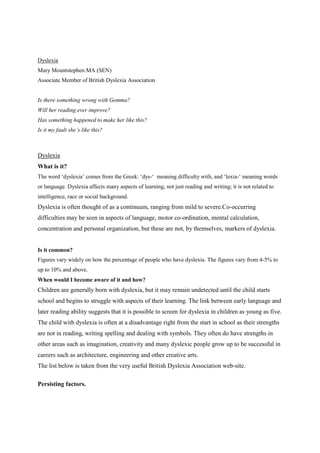
Dyslexia for mt l
- 1. Dyslexia Mary Mountstephen MA (SEN) Associate Member of British Dyslexia Association Is there something wrong with Gemma? Will her reading ever improve? Has something happened to make her like this? Is it my fault she’s like this? Dyslexia What is it? The word ‘dyslexia’ comes from the Greek: ‘dys-‘ meaning difficulty with, and ‘lexia-‘ meaning words or language. Dyslexia affects many aspects of learning, not just reading and writing; it is not related to intelligence, race or social background. Dyslexia is often thought of as a continuum, ranging from mild to severe.Co-occurring difficulties may be seen in aspects of language, motor co-ordination, mental calculation, concentration and personal organization, but these are not, by themselves, markers of dyslexia. Is it common? Figures vary widely on how the percentage of people who have dyslexia. The figures vary from 4-5% to up to 10% and above. When would I become aware of it and how? Children are generally born with dyslexia, but it may remain undetected until the child starts school and begins to struggle with aspects of their learning. The link between early language and later reading ability suggests that it is possible to screen for dyslexia in children as young as five. The child with dyslexia is often at a disadvantage right from the start in school as their strengths are not in reading, writing spelling and dealing with symbols. They often do have strengths in other areas such as imagination, creativity and many dyslexic people grow up to be successful in careers such as architecture, engineering and other creative arts. The list below is taken from the very useful British Dyslexia Association web-site. Persisting factors.
- 2. • Obvious 'good' and 'bad' days, for no apparent reason, • Confusion between directional words, e.g. up/down, in/out, • Difficulty with sequence, e.g. coloured bead sequences, later with days of the week or numbers, 2. Pre-school. • Has persistent jumbled phrases, e.g. 'cobbler's club' for 'toddler's club' • Difficulty learning nursery rhymes and rhyming words, e.g. 'cat, mat, sat'. • Later than expected speech development. Pre-school non-language indicators. • May have walked early but did not crawl - was a 'bottom shuffler' or 'tummy wriggler'. • Persistent difficulties in getting dressed efficiently and putting shoes on the correct feet. • Enjoys being read to but shows no interest in letters or words. • Is often accused of not listening or paying attention. • Difficulty with clapping a simple rhythm. 3. Primary school age. • Has particular difficulty with reading and spelling. • Leaves letters out of words or puts them in the wrong order. • Poor concentration. • Has problems understanding what he/she has read. • Takes longer than average to do written work. • Problems processing language at speed. Primary school age non-language indicators: • Has difficulty with tying shoe laces, tie, and dressing. • Has difficulty telling left from right, order of days of the week, months of the year etc. • Surprises you because in other ways he/she is bright and alert. • Has a poor sense of direction and still confuses left and right.
- 3. • Lacks confidence and has a poor self image. Can both boys and girls have it? It used to be thought that more boys than girls were dyslexic but it now appears that boys and girls are almost equally affected, but boys are more likely to identified, perhaps as a result of other associated problem such as poor behaviour and frustration. Is it inherited? Dyslexia does seem to run in families, although this is not always the case. Will it get better or worse? Can it be cured? Dyslexia need not be a barrier to success and achieving if it is recognised and if suitable teaching and other strategies are put in place. The general consensus is that children with dyslexia can be helped in a number of ways so that they can achieve to their potential, but their fundamental learning profile may not alter. Could anything else be causing this behaviour? Typically, a child of average intelligence who has been very well taught in literacy may appear to have few signs of dyslexia on the test, but they will have problems in the day to day life of the classroom. Dyslexia type symptoms can occur when there are eye tracking and perceptual problems that can cause words, letters and numbers to appear to move or jump on a page. There are cases where both problems are present and the child has both dyslexia and visual difficulties. What Can I Do About It? Many children have been helped by the Move to Learn Programme which can address some of the underlying issues which are creating barriers to effective learning. The web-site can offer you much advice on what to do and I can’t praise Barbara’s books highly enough.
